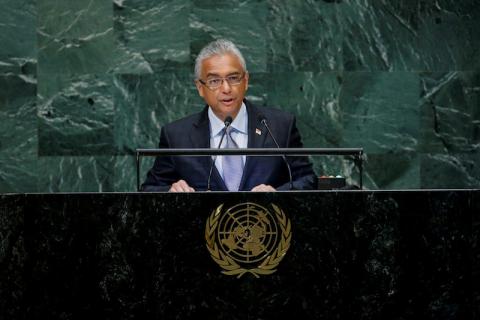Advertisement
Mauritius elects incumbent PM for five-year term
PORT LOUIS (Reuters) - Mauritius' ruling Militant Socialist Movement (MSM) has won more than half of the seats in parliament, securing incumbent Prime Minister Pravind Kumar Jugnauth a five-year term, the final election results showed on Friday.
Thursday's vote was dominated by calls for fairer distribution of wealth on the prosperous Indian Ocean island of 1.3 million people, which touts itself as a bridge between Africa and Asia and has a flourishing financial sector.
MSM won 38 of the 62 seats up for grabs while its rivals, the Labour Party and the Mauritian Militant Movement (MMM), garnered 13 and 9 seats respectively, the election commission said.
Two seats on the island of Rodrigues were won by the Organisation of the People of Rodrigues (OPR) party.
Jugnauth, 57, became prime minister in 2017 when his father stepped down from the post, and has already introduced a minimum wage to try and improve wealth distribution.
"I have obtained a clear mandate to continue to work towards progress and development in this country," he told his supporters after the count in his constituency.
The three parties campaigned on further strengthening the welfare state and improving equality in one of Africa's most stable and wealthy nations.
"I will ask everybody to respect the results without bitterness. Let's put Mauritius first" said Paul Bérenger, the leader of the MMM, during a speech in his constituency.
Some 723,660 voters, 76.84 percent of those eligible, turned out for the ballot, officials said.
The turnout was 2% higher than the last election.
Mauritius expects its economy, which is dependent on tourism and financial services, to expand by 4.1% next year, up from a forecast 3.8% this year. Analysts expect economic diversification to proceed regardless of who wins the election.
The challenger parties, arguing that the Jugnauth family's rule has been marked by nepotism and corruption, had appealed to voters to choose change.
Foreign direct investment in Mauritius totalled 10.68 billion rupees ($295 million) in the first six months of 2019 against 8.84 billion the same period a year earlier, according to official figures.
(Reporting by Jean Paul Arouff; Editing by Duncan Miriri and Hugh Lawson)



















Add new comment